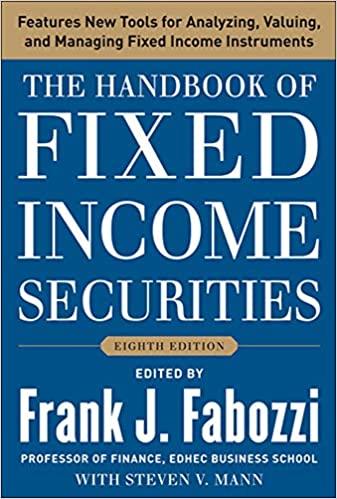Question
ICWS4: TVM LUMP SUMS (CHAPTER 3) 1. Draw time lines from your perspective for the following: (a) You lend $350 two years from now and
ICWS4: TVM LUMP SUMS (CHAPTER 3)
1. Draw time lines from your perspective for the following: (a) You lend $350 two years from now and are repaid a total of $497 seven years from now; (b) You borrow $200 today and repay a total of $248 four years from now.
2. You invest $800 at an annual rate of 8% for twelve years. (a) How much more interest would you earn in year 7 with compound vs. simple interest? (b) How much more for the whole 12 years?
3. You plan to buy a car when you graduate in 4 years. The car you want currently costs $20,000 and car prices are expected to increase by 5% per year. What will your car cost by the time you graduate? Suppose you wait another 2 years after graduation to make your purchase?
4. If you can earn 3% per year, how much would you have to invest today to purchase the car in #3 above in four years? In six years?
5. A housing developer sold 1,254 lots available in 2008 but only 435 in 2014. What was the annual rate of sales of lots over this period?
6. A new CEO promises to increase company sales by 7% per year from its current level of $5,435,678 to a target level of $8 million. How long would it take for the new CEO to reach this goal?
7. If your investment doubles in value in 12 years, what approximate annual rate of return would you have earned? If you could earn an annual rate of 4 5%, approximately how long would it take for your investment to double?
ICWS5: TVM MULTIPLE CASH FLOWS (CHAPTER 4)
1. Your parents tell you that if you apply yourself and earn a minimum grade of B- in Finance 3101 they will reward you by depositing in your account $500 next year, $1,000 the following year and $2,000 the year after that. If you can earn an annual rate of 6%, how much would you have in your account immediately after your parents last deposit?
2. If your parents in #1 above can earn 8% per year, what size one-time deposit would they have to make today so that they would be able to keep their promise?
3. A security that is selling for $1,500 and promises to pay annual interest of $130 forever would have an annual yield of?
4. You deposit $100 for the next 15 years earning 10% per year. What would your balance be at the end of the 15 Years?
5. You borrow $100,000 for 18 years at an annual rate of 7%. What would be your fixed QUARTERLY loan payment?
6. For the loan in #5 above, what percent of your first payment would apply to the principal?
7. A financial planner recommends that you have accumulated $1.5 million by the time that you retire in 30 years. If you can earn an annual rate of return of 7%, how much must you invest for each of the next 30 years to achieve this goal?
ICWS6: INTEREST RATES & BONDS (CHAPTERS 5 & 6)
1. If the APR is 8% and compounding is weekly, what is (a) the periodic rate and (b) the EAR?
2. For a nominal interest rate of 12% and inflation of 4%, according to the Fisher Effect, what would be the approximate real rate?
3. You would like to increase your purchasing power next year by about 5%. If you expect prices to increase at a rate of 3% over the next year, what approximate increase would you need in your salary in order to achieve this increase in your purchasing power goal?
4. You have $425 today which is enough to buy 17 shirts. If the price of shirts is expected to increase by 2% over the next year, what approximate nominal rate would you have to earn to be able to buy 20 shirts next year?
5. Eighteen years ago a firm issued $1,000 par value bonds with a 6% annual coupon rate and a term to maturity of 30 years. Market interest rates have increased since then and similar bonds today would carry an annual coupon rate of 8%. What would these bonds sell for today if they made (a) annual coupon payments; and (b) semiannual coupon payments?
6. For the bond in #5 above, if annual rates on similar bonds are now 5%, what could you sell your bond for today assuming (a) annual compounding; and (b) semiannual compounding?
7. If the annual coupon bond in #5 above is selling for $1,150 today, according to the approximate YTM formula, what is its annual YTM?
8. True or False: The YTM in #7 above is the precise YTM on that bond?
9. A 25-year zero coupon bond is selling for $450. What was the annual YTM on that bond using (a) annual compounding; and (b) semiannual compounding?
Step by Step Solution
There are 3 Steps involved in it
Step: 1

Get Instant Access to Expert-Tailored Solutions
See step-by-step solutions with expert insights and AI powered tools for academic success
Step: 2

Step: 3

Ace Your Homework with AI
Get the answers you need in no time with our AI-driven, step-by-step assistance
Get Started


